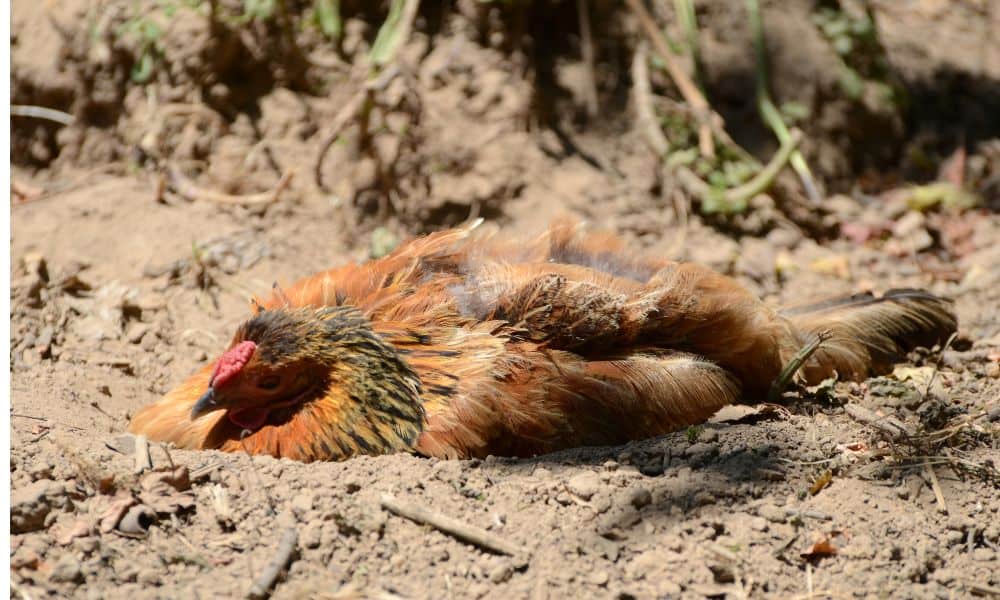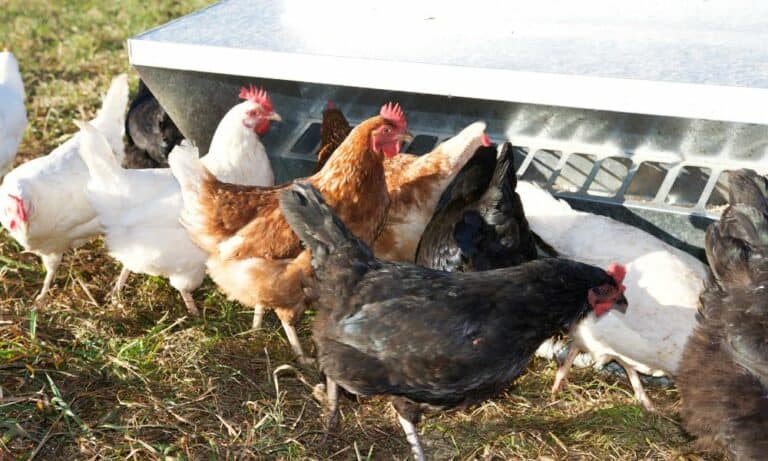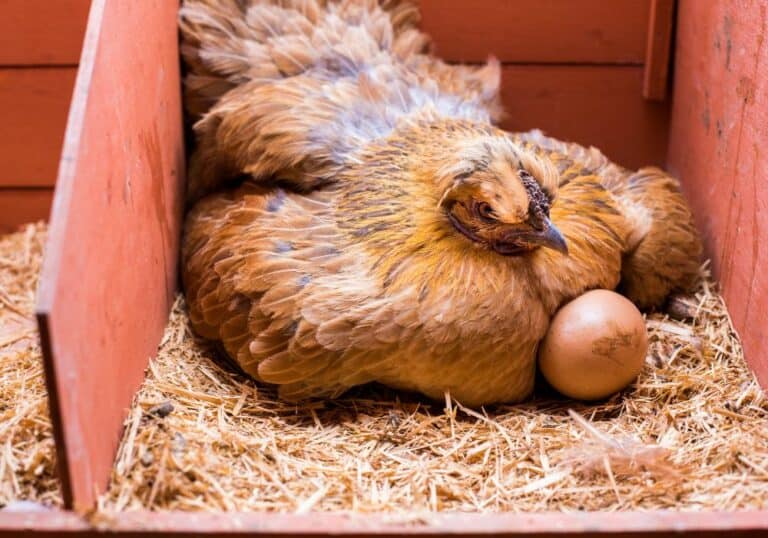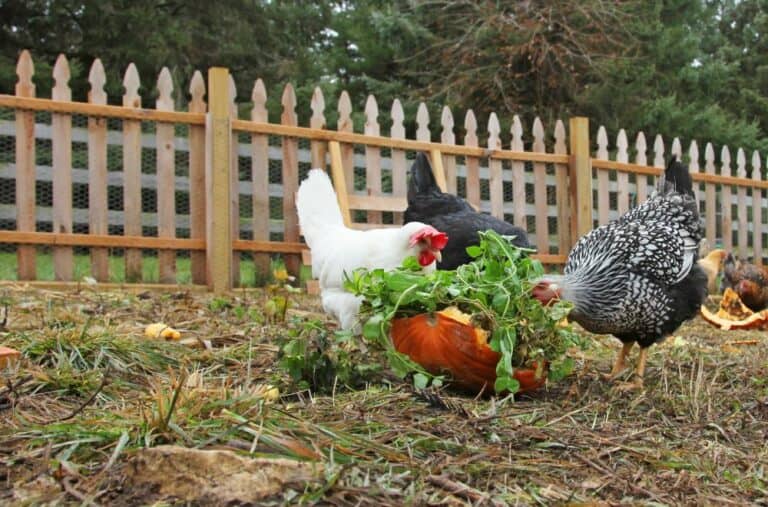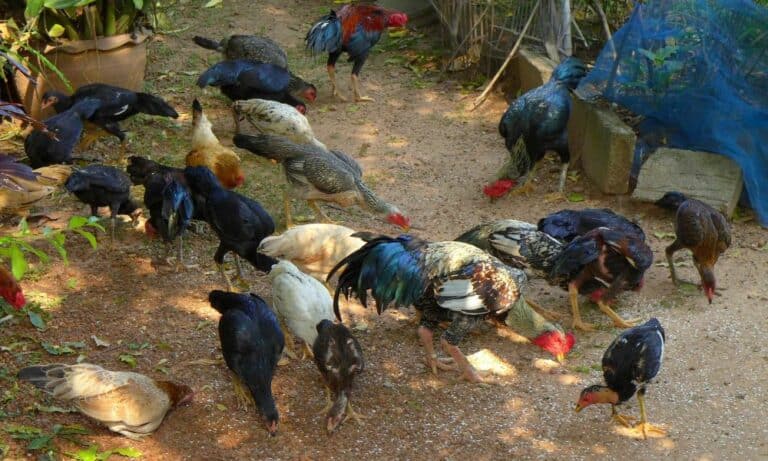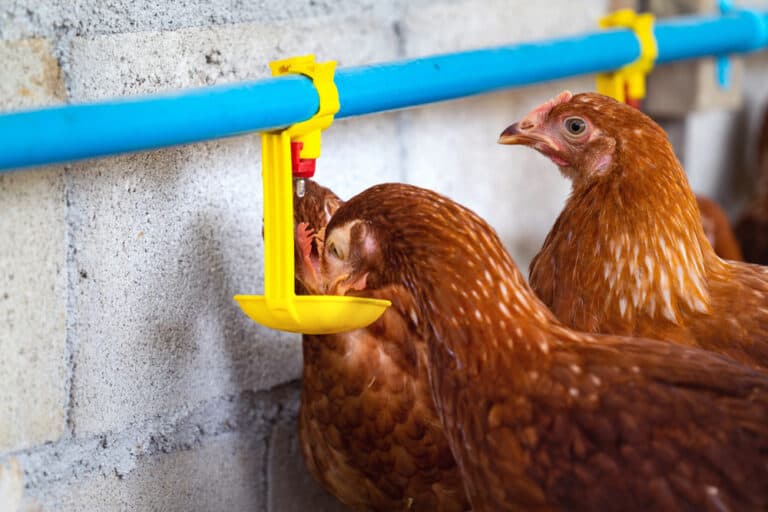If you want your chickens to be productive, it’s important for them to be happy, healthy and comfortable, and part of that means ensuring they get enough sleep.
But what are the sleeping habits of chickens? When do they sleep? And for how long?
To give you the answers to these and more, in this post, we look at the question, how do you know if a chicken is sleeping?
The sleeping habits of chickens
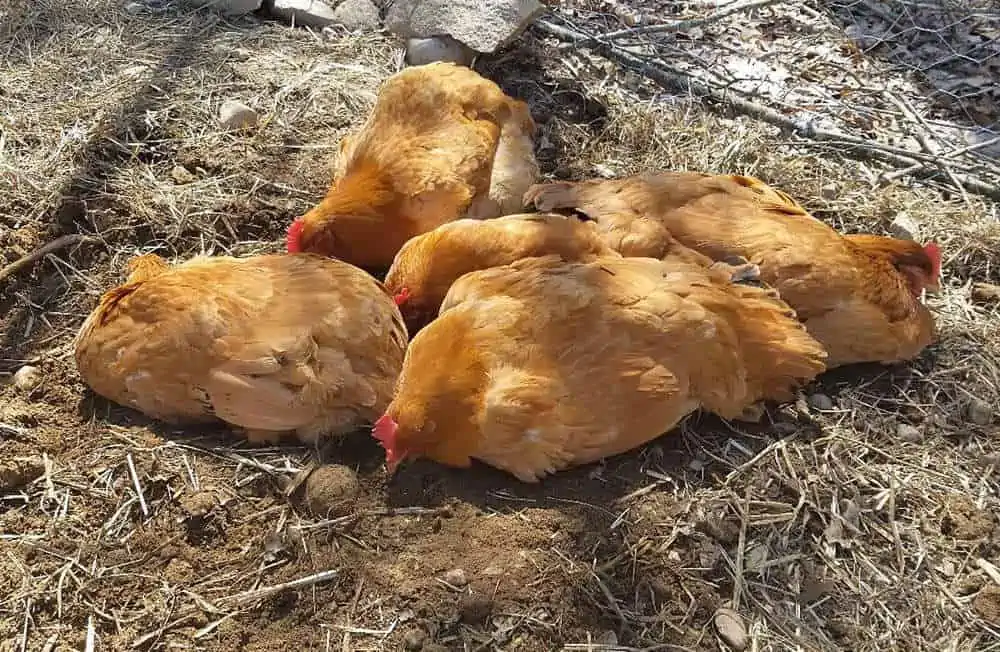
Before we talk about how you can tell if a chicken is asleep, let’s start by saying a few words about the sleeping habits of chickens.
Chickens, like humans, need around eight hours of sleep per night, although some will sleep more and some will sleep less.
The sleep cycle of a chicken is governed by daylight. Since they have poor night vision, chickens like to find a safe perch on which to roost, and once there, they will sleep for the whole night unless they are disturbed.
This is because, although chickens are completely domesticated, they are descended from junglefowl that originated in Southeast Asia – and these wild ancestors like to fly up into the branches of trees to spend the night out of the reach of predators.
While roosting in trees, junglefowl are kept hidden by the camouflage provided by their feathers, and domestic chickens have retained the same instinctive need to find a raised position to roost.
Since days are longer in summer than in winter, chickens sleep longer during the winter months, and interestingly, chickens can be asleep and awake at the same time.
They can do this since the right half of their brain is connected to the left eye and vice versa – so while one half of the brain sleeps, the other stays awake, keeping watch out of one open eye.
Sleeping and the pecking order
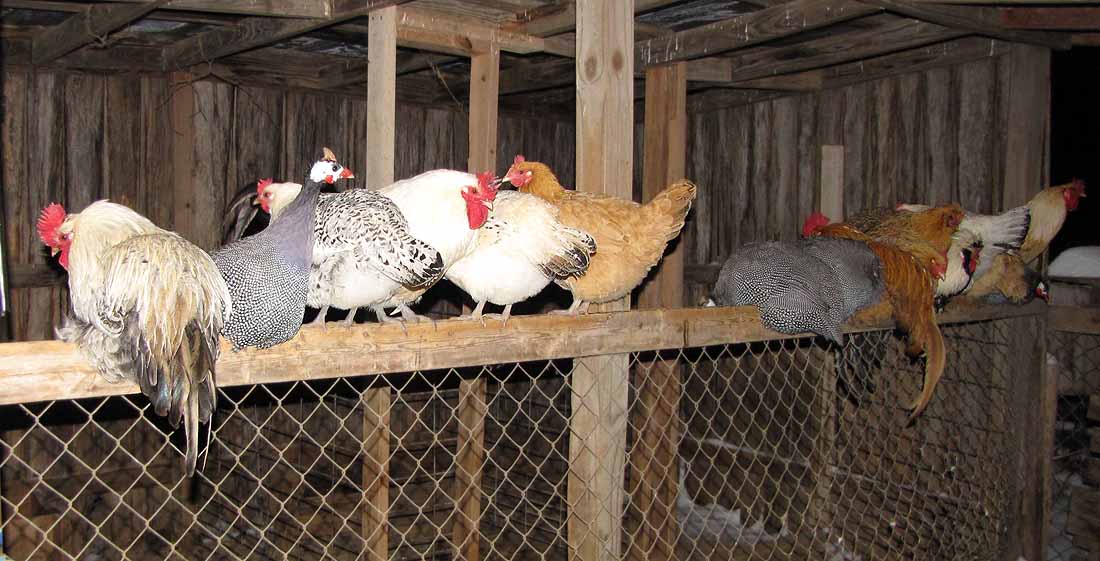
Chickens tend to sleep close together, and their relative positions are determined by the pecking order. The top hen will sleep in the highest, safest position and will sleep with both eyes closed.
The rest of the flock will arrange themselves around her, with the most junior birds lowest down and closest to danger.
These chickens will sleep with one eye open, and they will rotate during the night to allow all the chickens to sleep while others stay on watch.
How do you know if they’re asleep?
While chickens do most of their sleeping at night, they can also take naps during the day – so how can you tell if they’re asleep?
1. During the day
During the day, chickens can nap in all kinds of sleeping positions.
Sometimes, they will fly up to perch on something like the top of a fence to nap, and if you see them perched there immobile with one or both eyes closed, they are probably taking a few moments to catch up on some sleep.
Chickens also like to scratch out a small hole in the ground and will then curl up into it in a ball. This is another popular daytime sleeping position for chickens, and again, if you see one like this with one or both eyes closed, it’s probably asleep.
A more disconcerting sleeping position that some chickens adopt is when they stretch out on the ground.
This may sometimes worry more inexperienced chicken keepers because the chicken looks almost as though it is dead. There’s nothing to worry about though since the chicken will soon jump up and start pecking about as usual after a quick power nap.
However, there’s one position a chicken won’t use for sleeping and that’s standing up. If you see a chicken standing up with its eyes closed, it’s just taking a quick break and resting its eyes – but it isn’t truly sleeping.
2. At night in the coop
After the sun sets, your chickens should instinctively head into the coop and take their positions on their roosting perches to sleep for the night.
However, it can be a little more difficult to ascertain whether they are sleeping since you might not be able to see inside the coop – or if you open it up to see inside, you might disturb them and wake them up.
That said, if your chickens go into the coop after dusk and you can’t hear them moving about, it’s safe to assume that they are asleep since they have a strong instinctive impulse to fall asleep after dark.
At the same time, you should also pay attention to their behavior during the day since this can give you a clue as to how well they are sleeping at night.
Just like humans, if a chicken doesn’t get enough sleep at night, it will try to catch up during the day.
This means if your chickens seem to be sleeping excessively during the day, there could be a problem, so you should investigate why your chickens aren’t sleeping well at night.
The most common reason for this is that they are being stressed by the presence of a predator and aren’t sleeping properly because they are afraid.
For example, if a fox or a raccoon is visiting during the night and trying to get into the coop, it will prevent the chickens from sleeping properly, and this may cause them to sleep more during the day.
How to help chickens get a good night’s sleep
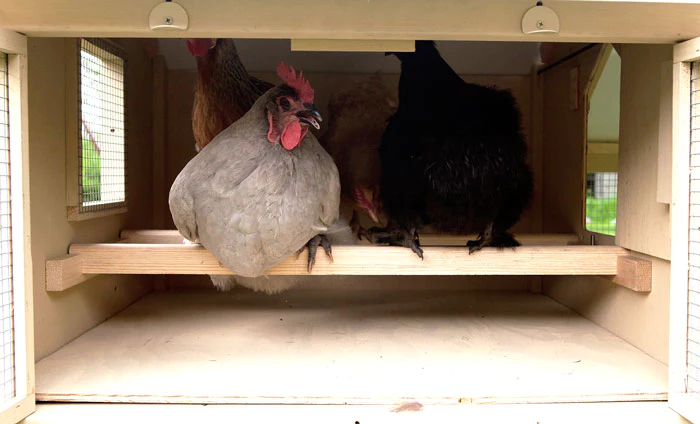
If you’re worried your birds are not sleeping well enough at night, what can you do to help them sleep better?
To sleep properly, chickens need to have a proper perch to roost on, and they need to feel secure – so here’s what you can do.
1. Give them perches
To give chickens somewhere to sleep soundly, you need to provide them with roosting perches.
These can be either flat pieces of wood or more rounded ones that mimic the branches that chickens would roost on in the wild.
There are many ways to do this, including setting up a ladder in the coop or even giving them perches made from tree branches.
In any case, however you choose to do it, the most important considerations are making sure the perches are high enough to make them feel safe and giving them enough space so they don’t need to fight over positions.
2. Make them feel safe
As well as making sure the chickens can perch high enough from the ground to feel safe, you also need to make sure they feel safe in other ways too.
This will mean ensuring they are properly secured in their coop where predators can’t get at them – and making sure predators don’t prowl around their coop at night will help them feel secure enough to get a good night’s sleep.
What to do if chickens sleep in nesting boxes
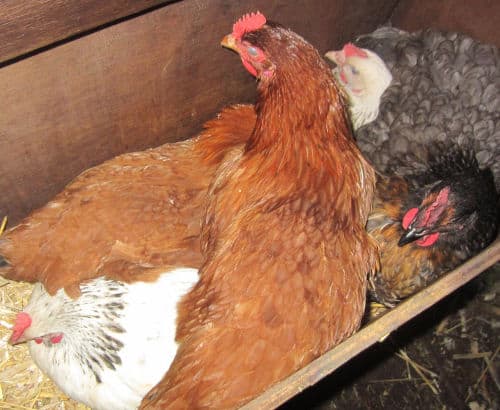
One problem that some chicken keepers encounter is that even though they give their birds plenty of roosting space, the chickens still prefer to sleep in their nesting boxes.
However, this is undesirable for several reasons.
First, chickens tend to poop a lot while they sleep, and if they sleep in their nesting boxes, they will foul them up, making them unhygienic places to be. Furthermore, they will also poop over any eggs they lay there, which is also less than preferable.
Also, chickens in dirty nesting boxes are more at risk of contracting parasites, and they may also overheat, especially if they all sleep in the same box together.
So if your chickens start sleeping in the nesting boxes, what can you do to discourage them?
1. Space
First, you need to make sure there’s enough space for your chickens to sleep on their roosting perches.
Sometimes, they can start sleeping in the nesting boxes because of overcrowding, so either you can install more perches or give them a larger coop with more perching space to solve the problem.
2. Perches higher than nesting boxes
Chickens like to sleep high up where they feel safe from danger, but if the nesting boxes are higher than their perches, this may cause them to choose the nesting boxes instead.
The answer to this is simple – in theory, at least – because all you need to do is redesign the coop so the perches are higher than the nesting boxes. And once you do this, the chickens should be happy to roost on the perches instead.
3. Uncomfortable or unstable perches
Another problem can be if the perches are uncomfortable or unstable.
Sometimes if the perches are the wrong shape or if they are slippery, chickens won’t like sleeping on them, instead preferring to spend the night in their nesting boxes.
Alternatively, the perches could be unstable – and if chickens think the perch isn’t safe to spend the night on, they will look for somewhere else that feels more secure.
So again, the solution is to make sure the perches are solid enough to give the chickens a sense of security when roosting there.
4. Dirty, smelly coop
Finally, if the coop is dirty or smelly, chickens are unlikely to want to sleep there. After all, you wouldn’t enjoy sleeping in a room filled with a foul odor, and neither will your birds.
This means if you clean the coop more often, the chickens are more likely to want to roost on their perches.
Safe and comfortable chickens can get a good night’s sleep
If your chickens are safe and comfortable, they will sleep better at night. This will mean they don’t need to nap as much during the day, and it should also mean they lay more eggs – and with this post, you now know how to tell if your birds are getting enough sleep.

